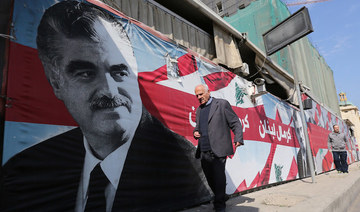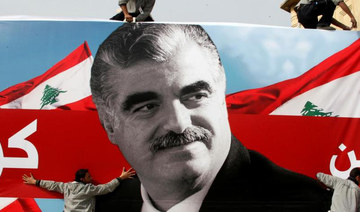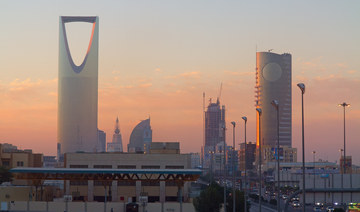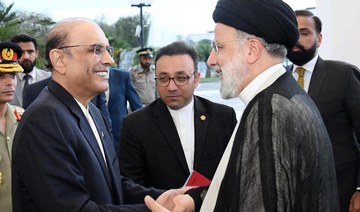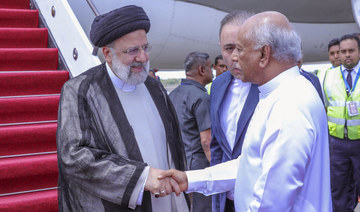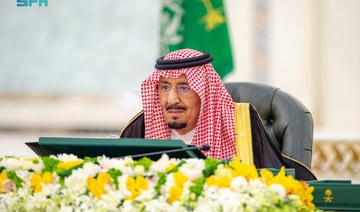LEIDSCHENDAM, Netherlands: Appeals judges at an international tribunal sentenced two members of the militant Hezbollah group to life imprisonment Thursday for their roles in the assassination of former Lebanese Prime Minister Rafik Hariri and the deaths of 21 other people in 2005.
Neither of the convicted men, Hassan Habib Merhi and Hussein Hassan Oneissi, has been arrested and sent to the Special Tribunal for Lebanon in the Netherlands. They were tried in their absence and remain at large.
Merhi and Oneissi were convicted on appeal in March of five crimes, including being accomplices to the intentional homicide of Hariri and the 21 others. They all were killed when plotters detonated a huge truck bomb outside a hotel on Beirut’s seafront as Hariri’s motorcade drove past.
The blast wounded another 226 people and plunged Lebanon deeper into political turmoil.
During a hearing Thursday, the tribunal’s president, Czech judge Ivana Hrdličková, said Merhi and Oneissi were receiving life sentences for each of their five convictions. If they are ever captured and imprisoned, the sentences would be served concurrently.
Prosecutors appealed after the two men were acquitted nearly two years ago following a lengthy trial that found another Hezbollah member, Salim Ayyash, guilty of involvement in the Feb. 14, 2005, blast. Ayyash, who also was tried in absentia, received a life prison sentence.
The tribunal’s 2020 verdict was met with anger and disappointment in parts of Lebanon. The trial judges said there was no evidence that Hezbollah’s leadership and Syria were involved in the attack but noted the assassination happened as Hariri and his political allies were discussing calling for Syria to withdraw its forces from Lebanon.
Hezbollah members get life terms for Lebanese leader’s death
https://arab.news/7j8n8
Hezbollah members get life terms for Lebanese leader’s death
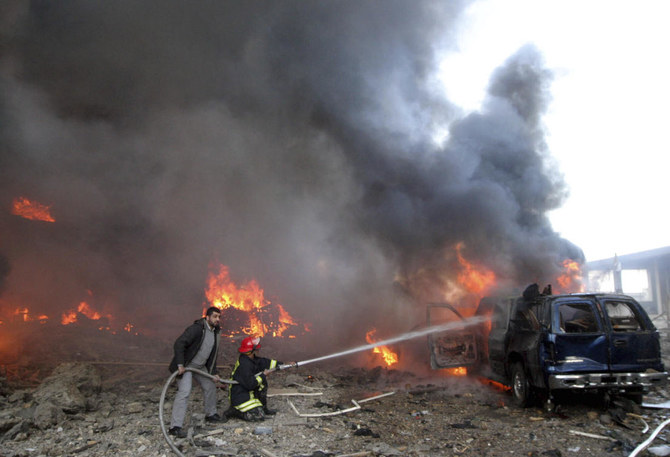
- Neither of the convicted men, Hassan Habib Merhi and Hussein Hassan Oneissi, has been arrested and sent to the Special Tribunal for Lebanon in the Netherlands
- Merhi and Oneissi were convicted on appeal in March of five crimes
Pakistan trains hundreds of volunteers ahead of annual Hajj pilgrimage
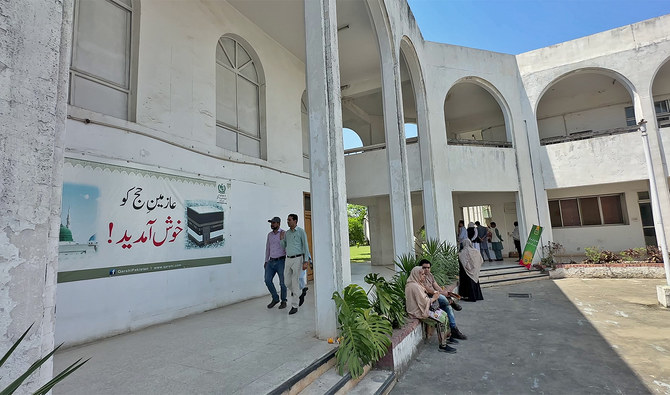
- Hajj is one of the five pillars of Islam and every adult Muslim is required to undertake it at least once in their lifetime
- Islamabad is to begin its Hajj flight operation from May 9 that would conclude on June 9 and facilitate over 63,000 pilgrims
ISLAMABAD: The Pakistani government has started training hundreds of volunteers ahead of the annual Hajj pilgrimage to help thousands of pilgrims overcome language barrier and other challenges in Saudi Arabia, besides imparting training to intending pilgrims on how to perform Hajj rituals.
Pakistan has a Hajj quota of 179,210 pilgrims this year. Of them, 63,805 pilgrims will be performing the pilgrimage under the government scheme, while the rest would be accommodated by private tour operators, according to the Pakistani religious affairs ministry. The South Asian country is set to start its Hajj flight operation on May 9, which would conclude on June 9.
The ministry conducts training of Hajj assistants and pilgrims every year ahead of their departure to Saudi Arabia to make sure the whole process, including their food, transportation and accommodation, is managed efficiently. This year, Pakistan will be sending 550 Hajj assistants and 400 doctors and paramedical staff to Saudi Arabia to facilitate the pilgrims.
“The training programs are currently underway at district and tehsil level and Islamabad is one of them,” Noor Muhammad Soomro, a deputy director at the Hajj directorate in Islamabad, told Arab News.
“Ministry of Religious Affairs has made very good arrangements for the pilgrims, and this includes Pak Hajj app. If a pilgrim uses the Pak Hajj app, he gets all the details, including training, vaccination, maps.”
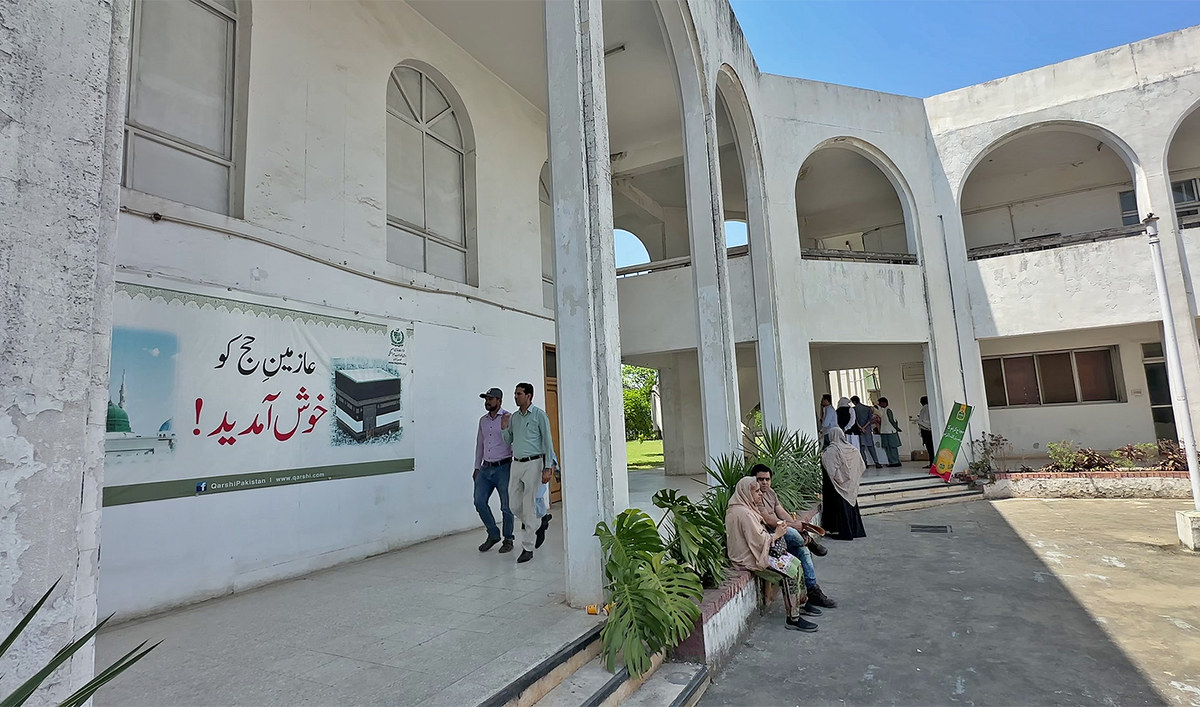
Soomro said each Pakistani pilgrim would be provided with a SIM card having 7GB data to connect with their families back home.
“This time, we will provide the train facility to all those pilgrims who travel to Saudi Arabia on the government scheme in Mina, Arafat and Muzdalifah,” he said.
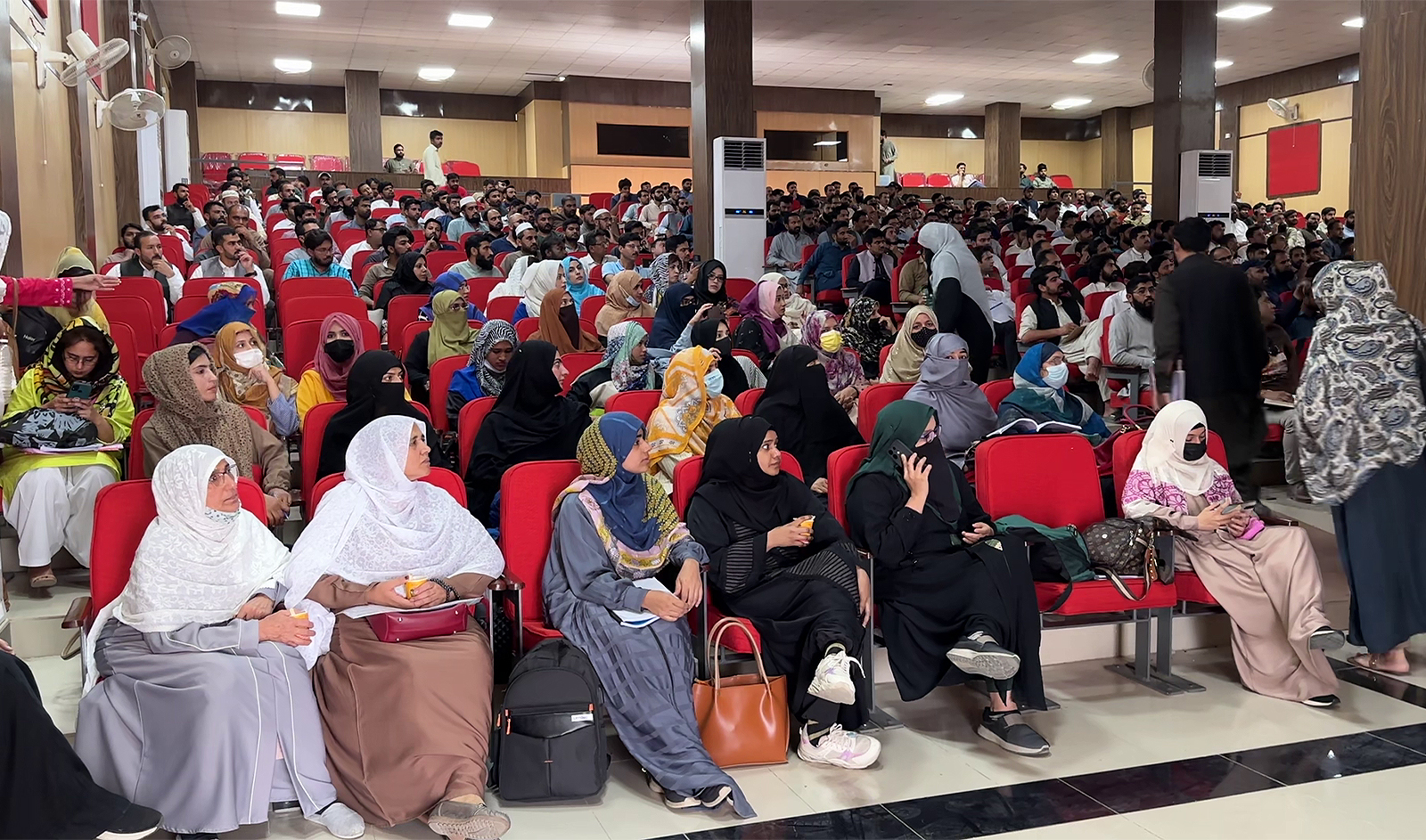
Hajj is an annual Islamic pilgrimage that has been in practice for over 1,400 years. It is one of the five pillars of Islam and requires every adult Muslim to undertake the journey to the holy Islamic sites in Makkah at least once in their lifetime if they are financially and physically able. This year’s pilgrimage is expected to run from June 14 till June 19.
Instructors have been training Hajj assistants and intending pilgrims at a sprawling auditorium at the Islamabad Hajji Camp, where they can also visit different stalls to purchase Hajj items like Ihram, umbrella and towels.
“This training is basically the introduction of the duties of Hajj,” Sanober Khaliq Baloch, a Hajj assistant, told Arab News. “Hajj assistants would be performing those duties for example the induction [of the pilgrims], the transport, the food and obviously about Mina map, a little about the roads and traveling, all these things.”
Speaking about the potential challenges, she said the temperature difference and up to 14 hours of duty could be “daunting,” but she was determined to facilitate the pilgrims in all possible way.
Faisal Hafeez, another Hajj assistant, said he was committed to serve the pilgrims well by taking care of their food, accommodation and transportation.
“Different problems that confront the pilgrims have been discussed here [during the training] and how we are supposed to deal with them and solve the problems,” he told Arab News.
Syeda Munir, who is going to perform Hajj for the first time, praised the training sessions, saying this would help them smoothly perform all rituals.
“This is my third [training] session,” she told Arab News. “They guide us well about how to perform Umrah and Hajj.”
GCC oil companies can maintain solid credit metrics in net-zero journey: S&P Global

RIYADH: National oil companies in Gulf Cooperation Council countries could absorb the additional investments needed to transition toward net-zero while maintaining robust credit metrics, said S&P Global.
In its latest report, the credit rating agency noted that NOCs in the GCC face similar energy transition risks as their global counterparts, but their strong financial positions will help mitigate these impacts.
Rawan Oueidat, credit analyst at S&P Global Ratings, said: “We expect that GCC NOCs will have sufficient financial buffers and competitive advantages to absorb the incremental investments that are necessary to catch up with global peers and that they can preserve their credit ratios over the next five years.”
He added: “GCC NOCs’ average low-carbon investments would have to total $15 billion-$25 billion annually at least until 2026 to keep up with those of global listed peers. Even after factoring in these investments, the overall effect on NOCs’ debt to EBITDA (earnings before interest, taxes, depreciation, and amortization) would be below 2.0x on average.”
According to the report, these firms can fund most of their net zero projects without having to revert to external financing sources.
S&P Global added that both banks and capital markets will play a role in funding the regional countries’ energy transition.
“Given the size of the GCC banking systems and their capitalization, we expect they will have the capacity to cater for the funding needs of the NOCs’ low-carbon investments over the next few years if necessary,” stated the agency.
It added: “However, we observe that NOCs, which are generally among the largest and internally-focused corporates in the GCC countries, are typically financed outside the local banking systems.”
The report highlighted that while firms in the region benefit from strong balance sheets, they will need to carefully consider investment requirements in relation to dividend distributions.
It further noted that the majority of NOCs in the GCC have already established net-zero targets, with Saudi Aramco aiming to achieve this by 2050 and Abu Dhabi National Oil Co. targeting a goal by 2045.
S&P Global further noted that environmental, social, and governance disclosures among oil firms in the region have increased, particularly in disclosing scope 2 emissions, but still lag behind their global counterparts.
However, the report highlighted that most NOCs in the GCC have not yet disclosed scope 3 emissions.
Scope 2 refers to emissions released into the atmosphere from the use of purchased energy.
On the other hand, scope 3 encompasses indirect emissions in a company’s value chain, and it is generally considered complex and challenging to report.
Iran cuts Syria presence after strikes blamed on Israel: monitor
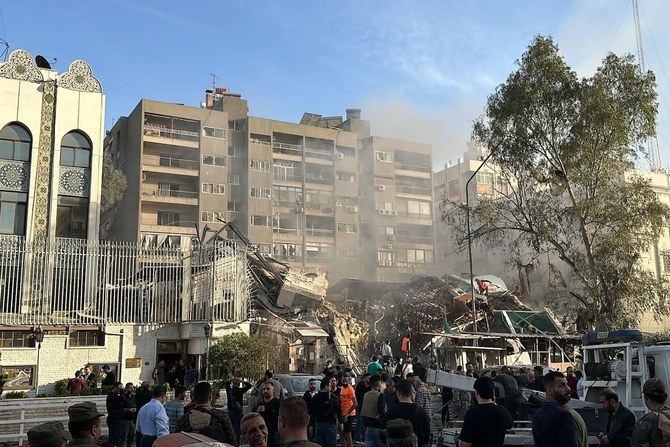
- Iran withdrew its forces from southern Syria, including both Quneitra and Daraa provinces
- Iran has said repeatedly that it has no combat troops in Syria, only officers to provide military advice and training
BEIRUT: Iran has reduced its military footprint in Syria after a succession of strikes blamed on Israel, a source close to Iran-backed militant group Hezbollah and a war monitor said Wednesday.
Iran has provided military support to Syrian government forces through more than a decade of civil war but a series of strikes targeting its commanders in recent months has prompted a reshaping of its presence, the sources said.
“Iran withdrew its forces from southern Syria,” including both Quneitra and Daraa provinces, which abut the Israeli-annexed Golan Heights, the source close to Hezbollah said.
But it still maintains a presence in other parts of the country, the source added.
Recent months have seen a series of strikes on Iranian targets in Syria, widely blamed on Israel, culminating in an April 1 strike that levelled the Iranian consulate in Damascus and killed seven Revolutionary Guards, two of them generals.
That strike prompted Iran to launch a first-ever direct missile and drone attack against Israel on April 13-14 that sent regional tensions spiralling.
But Iran had already begun drawing down its forces after a January 20 strike that killed five Revolutionary Guards in Damascus, including their Syria intelligence chief and his deputy, the source close to Hezbollah said.
Britain-based war monitor, the Syrian Observatory for Human Rights, said Iranian forces had withdrawn from Damascus and southern Syria.
Iran-backed Lebanese and Iraqi fighters had taken their place, Observatory chief Rami Abdel Rahman said.
Iran has said repeatedly that it has no combat troops in Syria, only officers to provide military advice and training.
But the Observatory says as many as 3,000 Iranian military personnel are present in Syria, supported by tens of thousands of Iran-trained fighters from countries including Lebanon, Iraq and Afghanistan.
Abdel Rahman said that many of Iran’s advisers had left Syria over the past six months, although some remained in Aleppo province in the north and in Deir Ezzor province in the east.
GCC logistics sector set to expand as Saudi Cabinet approves regional transport law

RIYADH: The logistics sector across the Gulf Cooperation Council region is set to prosper following the Saudi Cabinet’s approval of a land transport law within the region.
Chaired by King Salman, a ministerial session was held in Jeddah, during which the Cabinet reached consensus on several key proposals. Among these was the endorsement of the unified law.
The system is crafted to enhance the organizational environment, simplify procedures, and foster unity. Moreover, it aims to boost road safety, elevate service quality, protect investments, and stimulate growth in the logistics sector throughout the GCC region.



